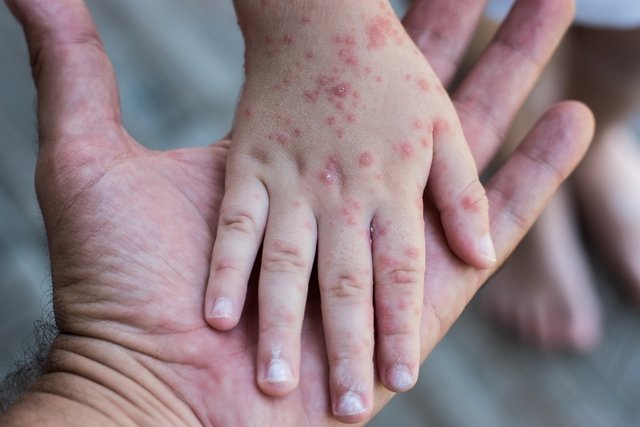Rubella symptoms include itchy red spots on the skin, general malaise, enlarged lymph nodes on the neck, headache, coughing, sneezing, runny nose, eye irritation and fever.
The first symptoms of rubella can be confused with the flu, as they are more general symptoms, however they can progress quickly. Therefore, it is important to see a doctor if you notice these symptoms to determine the underlying cause.
The symptoms of rubella during pregnancy and in babies who were infected after birth are the same as those seen in other populations.. However, when a pregnant woman develops rubella, fetal development may be impaired.

Main symptoms
The main symptoms of rubella are:
- Red, itchy spots on the skin
- Fever up to 38ºC (or 100.4ºC)
- Runny nose and sneezing
- Coughing
- Headache
- General malaise
- Enlarged lymph nodes, especially near the neck
- Eye irritation, leading to redness
Rubella symptoms can appear 12 to 21 days after initial contact with the virus. The infection is at its highest risk for transmission seven days before the spots appear on the skin, and can persist for up to seven days after they appear.
How to know if it's rubella
The initial diagnosis of rubella is made by assessing the signs and symptoms. The doctor may order a blood test to check the presence of antigens or antibodies formed against the Rubivirus, which causes Rubella. This test is also known as a known as rubella IgG test.
This blood test can also be ordered to whether the person has been immunized against this virus or not. It is important that it is carried out together with the rubella IgM test.
Treatment options
Treatment for rubella should be carried out as directed by a doctor. It is aimed at relieving symptoms with analgesic medications, rest and hydration. It is also important to remain isolated to prevent transmitting the disease to others.
Children born with congenital rubella should be monitored by a team of doctors, as there is a risk for developing complications as a result. Once recovered from the infection, children should be seen by specialists and physiotherapists to monitor motor and brain development.
